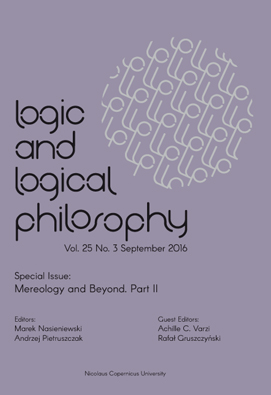Mereology and truth-making
DOI:
https://doi.org/10.12775/LLP.2015.020Keywords
mereology, mereological propositions, truth-makers, continuantsAbstract
Many mereological propositions are true contingently, so we are entitled to ask why they are true. One frequently given type of answer to such questions evokes truth-makers, that is, entities in virtue of whose existence the propositions in question are true. However, even without endorsing the extreme view that all contingent propositions have truth-makers, it turns out to be puzzlingly hard to provide intuitively convincing candidate truth-makers for even a core class of basic mereological propositions. Part of the problem is that the relation of part to whole is ontologically intimate in a way reminiscent of identity. Such intimacy bespeaks a formal or internal relation, which typically requires no truth-makers beyond its terms. But truth-makers are held to necessitate their truths, so whence the contingency when A is part of B but need not be, or B need not have A as part? This paper addresses and attempts to disentangle the conundrum.References
Armstrong, D.M., Truth and Truthmakers, Cambridge, Cambridge University Press, 2004. DOI: 10.1017/CBO9780511487552
Bigelow, J., The Reality of Numbers, Oxford, Clarendon Press, 1988.
Henry, D.P., Medieval Logic and Metaphysics, London, Hutchinson, 1972.
Keele, R., “Walter Chatton”, The Stanford Encyclopedia of Philosophy (Spring 2014 Edition), Edward N. Zalta (ed.), 2014. http://plato.stanford.edu/archives/spr2014/entries/walter-chatton/
Mulligan, K., P.M. Simons, and B. Smith, “Truth-Makers”, Philosophy and Phenomenological Research, 44 (1984): 287–322. DOI: 10.2307/2107686
Simons, P.M., Parts, Oxford, Clarendon Press, 1987. DOI: 10.1093/acprof:oso/9780199241460.001.0001
Simons, P.M., “How the world can make propositions true: A celebration of logical atomism”, pages 113–135 in M. Omyła (ed.), Skłonność metafizyczna: Bogusławowi Wolniewiczowi w darze, Warsaw, Uniwersytet Warszawski, 1997.
Simons, P.M., “How to exist at a time when you have no temporal parts”, The Monist, 83 (2000): 419–436. DOI: 10.5840/monist200083321
Simons, P.M., “Why the negations of false atomic sentences are true”, in T. de Mey andM. Keinänen (eds.), Essays on Armstrong. Acta Philosophica Fennica, 84 (2008): 15–36.
Downloads
Published
How to Cite
Issue
Section
Stats
Number of views and downloads: 789
Number of citations: 0







